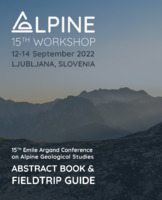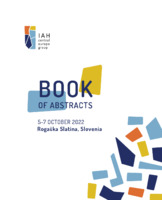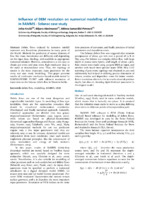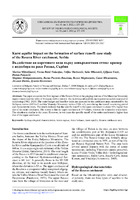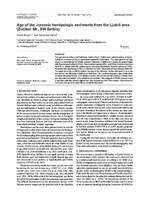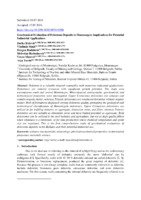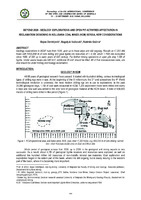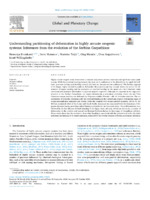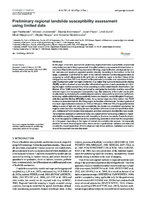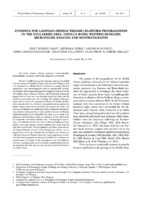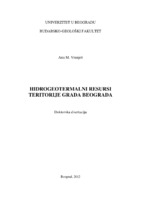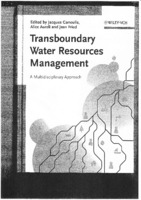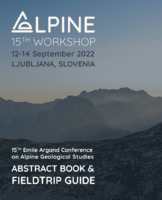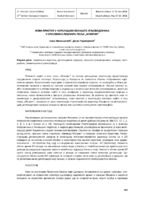Претрага
519 items
-
The Albian/Cenomanian Boundary Event (OAE1d) reflected in ammonite-rich layers in central Serbia (Topola area)
Marija Vuletić, Hans-Jürgen Gawlick, Nevenka Đerić, László Bujtor, Katarina Bogićević, Draženko Nenadić (2022)Marija Vuletić, Hans-Jürgen Gawlick, Nevenka Đerić, László Bujtor, Katarina Bogićević, Draženko Nenadić. "The Albian/Cenomanian Boundary Event (OAE1d) reflected in ammonite-rich layers in central Serbia (Topola area)" in 15th Emile Argand Conference on Alpine Geological Studies, 12–14 Sep 2022, Ljubljana, Slovenia, University of Ljubljana, Faculty of Natural Sciences and Engineering, Department of geology (2022)
-
The impact of temporal variability of groundwater levels on groundwater vulnerability maps in karst terrains – a case example of the Perućac spring catchment area
Groundwater vulnerability maps represent an essential tool for protecting karst groundwater resources. Vulnerability assessment is usually based on spatial evaluation of various parameters that affect the vulnerability degree and regulate the protection role of the unsaturated zone. Most of these parameters, like soil and geology conditions, are constant and do not change during the year or over several years. In contrast, some parameters, such as the groundwater level, depend on the variability of recharge conditions. By considering the variability ...Vladimir Živanović, Igor Jemcov, Nebojša Atanacković. "The impact of temporal variability of groundwater levels on groundwater vulnerability maps in karst terrains – a case example of the Perućac spring catchment area" in 5th IAH CEG conference, Slovenian Committee of International Association of Hydrogeologists - SKIAH (2022)
-
Influence of DEM resolution on numerical modelling of debris flows in RAMMS - Selanac case study
Debris flows induced by intensive rainfall represent very hazardous phenomena in many parts of the World. Methods for prediction of runout distance of flow like mass movements are different and depending on the input data, rheology, and available or appropriate numerical solution. However, sometimes it is not easy to obtain pre event and post event high-resolution data in the rural or mountainous area. Thus, the topology of terrain is the most important input parameter for the every real case ...... flows. Geographical position of tested area is shown on Fig.1. Figure 2 Geographical position of the Selanac case study Geological settings are very complex; initiation zone belongs to Jurassic ophiolites, while transportation and deposition area belongs to tectonic contact of Triassic ...
... deference in topography before and after the activation of the debris flow, b) Pleiades image after the event and position of defined release area Source area was defined as a block within average depth of 15 m. In previous results we considered much more averaged depth which resulted in large amount ...
... appropriate numerical solution. However, sometimes it is not easy to obtain pre event and post event high-resolution data in the rural or mountainous area. Thus, the topology of terrain is the most important input parameter for the every real case study modelling,. This paper presents results of continuum ...Jelka Krušić, Biljana Abolmasov, Mileva Samardžić Petrović. "Influence of DEM resolution on numerical modelling of debris flows in RAMMS - Selanac case study" in 4th Regional Symposium on Landslides in the Adriatic Balkan Region, 23-25 October 2019, Sarajevo, Bosnia and Herzegovina, Geotechnical Society of Bosnia and Herzegovina (2019). https://doi.org/ 10.35123/ReSyLAB_2019
-
Numerical Models of Debris Flows with Entrainment Analysis-Case Studies from the Republic of Serbia
The results of material entrainment analysis in RAMMS debris flow software, as well as numerical models of final flow heights for two case studies from the Republic of Serbia are presented. Both of debris flow cases started with initial sliding of huge volume block, prolonging to behave as flowing process. Results of the analysis showed that entrainment material affects final results of transportation model, runout distance, deposition area and volume of debris flow. In both cases entrainment volume is very ...Jelka Krušić , Biljana Abolmasov, Miloš Marjanović. "Numerical Models of Debris Flows with Entrainment Analysis-Case Studies from the Republic of Serbia" in Understanding and Reducing Landslide Disaster Risk. WLF 2020. ICL Contribution to Landslide Disaster Risk Reduction, Springer, Cham (2021). https://doi.org/10.1007/978-3-030-60706-7_25
-
Neogene to Quaternary basalts of the Jabal Eghei (Nuqay) area (south Libya): Two distinct volcanic events or continuous volcanism with gradual shift in magma composition?
Radivojević Maša, Toljić Marinko, Turki Salah, Bojić Zoran, Šarić Kristina, Cvetković Vladica (2015)Radivojević Maša, Toljić Marinko, Turki Salah, Bojić Zoran, Šarić Kristina, Cvetković Vladica. "Neogene to Quaternary basalts of the Jabal Eghei (Nuqay) area (south Libya): Two distinct volcanic events or continuous volcanism with gradual shift in magma composition?" in Journal of Volcanology and Geothermal Research 293, Amsterdam:Elsevier (2015): 57-74. https://doi.org/10.1016/j.jvolgeores.2015.02.0
-
Karst aquifer impact on the formation of surface runoff: case study of the Resava River catchment, Serbia
Marina Mitrašinović, Vesna Ristić Vakanjac, Veljko Marinović, Saša Milanović, Ljiljana Vasić, Dušan Polomčić (2022)The paper compares the flow regimes of the Resava River at the gauging stations of the Manasija Monastery (upper course) and the town of Svilajnac (lower course). The hydrological analysis encompasses a multiyear period of monitoring (1982–2020). The water budget and baseflow index are assessed for the catchment areas monitored by the Svilajnac station (683 km2) and the Manasija Monastery station (358k m2), considering the overall monitoring period and characteristic years. The results indicate that the specific runoff in ...... Tresta in the east, an area between the southwestern part of Mt. Beljanica (1339 m) and the northwestern part of the Kučaj Mountains (1284 m). The Resava Gorge was formally desig- nated as a protected area in 1955, as part of the Up- per Resava Regional Nature Park. The area hosts several natural ...
... highcer than that of the upper catchment. Keywords: hydrogeological characteristics, water regime, water balance, karst aquifer, Resava catchment area. Introduction The Resava catchment is in the northern part of East- ern Serbia, between the Velika Morava River and the slopes of the Kučaj-Beljanica ...
... 668 m. It is a major right-side tributary ofthe Velika Morava (Dukić, Gavrilović, 2014). The total length ofthe Resava is 65.5 km and its catchment area (ac- cording to the National Hydrometeorological Scr- vice) is 681 km?. It generally flows in the SE-NW direction, all the way to its mouth near ...Marina Mitrašinović, Vesna Ristić Vakanjac, Veljko Marinović, Saša Milanović, Ljiljana Vasić, Dušan Polomčić. "Karst aquifer impact on the formation of surface runoff: case study of the Resava River catchment, Serbia" in National Conference with International Participation “GEOSCIENCES 2022”, Sofia : Bulgarian geological society (2022)
-
New biostratigraphic, sedimentological, and radiometric data from Lower - Middle Miocene of the Zaječar area (westernmost part of Dacian basin, eastern Serbia)
Rundić Ljupko, Vasić Nebojša, Banješević Miodrag, Prelević Dejan, Gajić Violeta, Jovanović Marija, Pantelić Nemanja, Stefanović Jelena (2018)Rundić Ljupko, Vasić Nebojša, Banješević Miodrag, Prelević Dejan, Gajić Violeta, Jovanović Marija, Pantelić Nemanja, Stefanović Jelena. "New biostratigraphic, sedimentological, and radiometric data from Lower - Middle Miocene of the Zaječar area (westernmost part of Dacian basin, eastern Serbia)" in Geologica Balcanica. Abstract Book. XXI International Congress of the Carpathian Balkan Geological Association (CBGA) Salzburg (Austria), September 10–13, 2018. Advances of Geology in southeast European mountain belts, Sofia:Geological Institute, Bulgarian Academy of Sciences (2018): 99-99
-
The Geology of the Zlatibor-Maljen Area (Western Serbia): a Geotraverse Across the Ophiolites of the Dinaric-Hellenic Collisional Belt
Chiari Marco, Đerić Nevenka, Garfagnoli Francesca, Hrvatović Hazim, Krstić Marko, Levi Nicola, Malasoma Alessandro,Marroni Michele, Menna Francesco, Nirta Giuseppe, Pandolfi Luca, Principi Gianfranco, Saccani Emilio, Stojadinović Uroš, Trivić Branislav (2011)Chiari Marco, Đerić Nevenka, Garfagnoli Francesca, Hrvatović Hazim, Krstić Marko, Levi Nicola, Malasoma Alessandro,Marroni Michele, Menna Francesco, Nirta Giuseppe, Pandolfi Luca, Principi Gianfranco, Saccani Emilio, Stojadinović Uroš, Trivić Branislav. "The Geology of the Zlatibor-Maljen Area (Western Serbia): a Geotraverse Across the Ophiolites of the Dinaric-Hellenic Collisional Belt" in Ofioliti 2 no. 36, 56126 Pisa, Italy:Publisher Edizioni ETS (2011): 137-164. https://doi.org/10.4454/OFIOLITI.V36.I2.3
-
Age of the Jurassic hemipelagic sediments from the Ljubiš area (Zlatibor Mt., SW Serbia)
Nikita Bragin, Nevenka Đerić (2020)... Jurassic hemipelagic sediments from the Ljubiš area (Zlatibor Mt., SW Serbia) Nikita Bragin, Nevenka Đerić Дигитални репозиторијум Рударско-геолошког факултета Универзитета у Београду [ДР РГФ] Age of the Jurassic hemipelagic sediments from the Ljubiš area (Zlatibor Mt., SW Serbia) | Nikita Bragin, ...
... c data from these sedimentary rocks based on radiolarians. 2. GEOLOGICAL OVERVIEW The research area is situated in SW Serbia, in Ljubiš Village on the eastern flanks of Mt. Zlatibor. The wider area is characterized by a rather complicated structure. According to SCHMID et al. (2008), it comprises ...
... A simplified geologic map of the Zlatibor-Zlatar area with the position of the Djokov Potok section (modified after DJERIĆ et al., 2012). G eo lo g ia C ro a tica Bragin and Djerić: Age of the Jurassic hemipelagic sediments from the Ljubiš area (Zlatibor Mt., SW Serbia) 145 al., 2008) or Late ...Nikita Bragin, Nevenka Đerić. "Age of the Jurassic hemipelagic sediments from the Ljubiš area (Zlatibor Mt., SW Serbia)" in Geologia Croatica, Croatian Geological Survey (2020). https://doi.org/10.4154/gc.2020.11
-
Geochemical evaluation of dolostone deposits in Montenegro: Implications for potential industrial applications
Darko Bozovic, Vladimir Simic, Dragan Radulovic, Slobodan Radusinovic, Vesna Matovic, Anja Terzic (2024)This study presents a unique model for assessing the dependability of continuous parts of combined systems in open-pit mining through the application of fuzzy logic. Continuous sub-systems as part of the combined system of coal exploitation in surface mines have the basic function of ensuring safe operation, high capacity with high reliability, and low costs. These subsystems are usually part of the thermal power plant’s coal supply system and ensure stable fuel supply. The model integrates various independent partial ...примарне сировине, минералогија, физичко-механичка својства, технолошка својства, наука о материјалимаDarko Bozovic, Vladimir Simic, Dragan Radulovic, Slobodan Radusinovic, Vesna Matovic, Anja Terzic. "Geochemical evaluation of dolostone deposits in Montenegro: Implications for potential industrial applications" in Science of Sintering, Bor, August 2024, National Library of Serbia (2024). https://doi.org/10.2298/SOS240701029B
-
BEYOND 2020 - Geology explorations and open pit activities affectation in reclamation designing in Kolubara Coal Mines (KCM) Serbia, new considerations
Geology explorations in KCM runs from 1936. year up to these days and still ongoing. Results in >7,200 drill holes with ≈600,000 m of core drilling and gave lignite ore resources of > 4,1Bt, which 1,15Bt are excavated since 1986. of XIX up to early years of XXI century. For further mining operations in open pits stay 1,5Bt of lignite. Under waste heaps are ≈80 km2, additional 85 km2 should be filled. All of that masses/areas were, are ...Bojan Dimitrijević, Bogoljub Vučković, Radmila Gaćina. "BEYOND 2020 - Geology explorations and open pit activities affectation in reclamation designing in Kolubara Coal Mines (KCM) Serbia, new considerations" in 17th International Conference of the open and underwater mining of minerals, Sts. Constantine and Helena Resort, Varna, 18-22 September, Bulgaria, Sofia, Bulgaria : Scientific and Technical Union of Mining, Geology and Metallurgy, (2023)
-
Understanding partitioning of deformation in highly arcuate orogenic systems: Inferences from the evolution of the Serbian Carpathians
Nemanja Krstekanić, Liviu Matenco, Marinko Toljić, Oleg Mandić, Uroš Stojadinović, Ernst Willingshofer (2020)... orogen-parallel extension and strike- slip deformation in the area of the Morava Valley Corridor and the adjacent N-S oriented segment of the Serbian Carpathians (Figs. 1 and 2; e.g., Erak et al., 2017). Furthermore, this is the same area where orogenic extension driven by eduction or roll-back in ...
... We have performed our fieldwork in the key area of interference between strike-slip, orogen-parallel and orogen-perpendicular exten- sion, which is where the Supragetic and Getic units are in close prox- imity to the Morava Valley Corridor (Fig. 2). This area benefits from the high quality and full coverage ...
... studied area (complied after Kräutner and Krstić et al. (2003) and Basic geological map of former Yugoslavia, scale 1:100.000). Faults colored in purple are thrusts active during this phase, light green faults are active strike-slip faults, while black faults are other major faults in the area. Suggested ...Nemanja Krstekanić, Liviu Matenco, Marinko Toljić, Oleg Mandić, Uroš Stojadinović, Ernst Willingshofer. "Understanding partitioning of deformation in highly arcuate orogenic systems: Inferences from the evolution of the Serbian Carpathians" in Global and Planetary Change, Elsevier BV (2020). https://doi.org/10.1016/j.gloplacha.2020.103361
-
Evidence for Badenian marine transgression in Belgrade (Serbia)
Filip Anđelković, Dejan Radivojević (2019)... belongs to the Badenian stage. Belgrade is located on the southern rim of the Pannonian Basin (Marović et al, 2007). Badenian sediments in the Belgrade area are represented by four facies: Rakovica clastics, Tašmajdan limestones, Višnjica clays and Konjarnik schlier (Anđelković M., 1987; Anđelković, M ...
... raphic significance. The onset of transgression is well-marked by the occurrence of typical basal conglomerates at several locations in the city area, especially at Kalemegdan fortress and Rakovica stream. These conglomerates contain rich marine mollusc fauna, belonging to the Ostrea order, which ...
... Mediterranean is the cause for the partial isolation and fall of salinity (Rögl, 1999). REFERENCES Anđelković, M. 1987. Geology of the wider Belgrade area – Geology and geodynamics. Institute for regional geology and palaeontology, Faculty of Mining and Geology, p. 428 (in Serbian) Anđelković, M., Anđelković ...Filip Anđelković, Dejan Radivojević. "Evidence for Badenian marine transgression in Belgrade (Serbia)" in AAPG Vienna, Paratethys petroleum systems between Central Europe and the Caspian Region, Vienna, 26-27 mart, 2019, AAPG (2019)
-
Preliminary regional landslide susceptibility assessment using limited data
Igor Peshevski, Milorad Jovanovski, Biljana Abolmasov, Jovan Papic, Uroš Đurić, Miloš Marjanović, Ubydul Haque, Natasha Nedelkovska (2019)In this paper a heuristic approach for preliminary regional landslide susceptibility assessment using limited amount of data is presented. It is called arbitrary polynomial method and takes into account 5 landslide conditioning parameters: lithology, slope inclination, average annual rainfall, land use and maximum expected seismic intensity. According to the method, in the first stage, a gradation is performed for each of the carefully selected conditioning parameters by assigning so called rating points to the grid cells on which the ...... age are the commonly occurring ones in the area, and here belong to the phyllitic schists, meta- conglomerates, metasandstones, quartzites, quartz-chlorite schists, carbonate schists and marbles. It is important to note that most landslides in the study area have been reported to occur at the contact ...
... using limited data. 85 The study area belongs to seismic zones where the maximum expected seismic intensities of 7, 8 and 9 are likely, (according to the MSK scale) for return periods of 100 and 500 years. The strongest recorded earthquake in the study area in the past 100 years was registered ...
... cm, and in the higher altitudes up to a metre. In relation to rainfall, the study area is characterized by the highest average annual precip- itation in the whole country. On some of the highest elevations in the area, the annual precipitation is over 1250 mm per year, while in the flat Polog valley ...Igor Peshevski, Milorad Jovanovski, Biljana Abolmasov, Jovan Papic, Uroš Đurić, Miloš Marjanović, Ubydul Haque, Natasha Nedelkovska. "Preliminary regional landslide susceptibility assessment using limited data" in Geologica Croatica , Croatian Geological Society (2019). https://doi.org/10.4154/gc.2019.03
-
Evidence for Ladinian (Middle Triassic) platform progradation in the Gyulakeszi area, Tapolca Basin, Western Hungary: Microfacies Analysis and Biostratigraphy
Zsolt Robert Nagy, Nevenka Đerić, Sándor Kovács, Anna Oravecz-Scheffer, Felicitász Velledits, Olga Piros, Gabor Csillag (2014)... was first studied by L6czy (1916) who described reef limestones from the area nearby the towns of Gyulakeszi and Di- szel (Fig. 1c). Occurrence of nodular limestone and shal- low marine carbonates were reported from the area on the 1:50,000 geological map (Budai et al. 1999) but their stratigraphic ...
... were conducted on both units ex- posed in the area in order to characterize the deposi- tional environment and the age of the carbonates. The study also provides an opportunity to improve our un- derstanding on the sedimentary system in the area west of the Tagyon sea mount. Geological Setting ...
... Измењено: 2023-11-06 11:13:48 Evidence for Ladinian (Middle Triassic) platform progradation in the Gyulakeszi area, Tapolca Basin, Western Hungary: Microfacies Analysis and Biostratigraphy Zsolt Robert Nagy, Nevenka Đerić, Sándor Kovács, Anna Oravecz-Scheffer, Felicitász ...Zsolt Robert Nagy, Nevenka Đerić, Sándor Kovács, Anna Oravecz-Scheffer, Felicitász Velledits, Olga Piros, Gabor Csillag. "Evidence for Ladinian (Middle Triassic) platform progradation in the Gyulakeszi area, Tapolca Basin, Western Hungary: Microfacies Analysis and Biostratigraphy" in Rivista Italiana di Paleontologia e Stratigrafia (2014)
-
Hidrogeotermalni resursi teritorije grada Beograda
Ana Vranješ (2012-12-12)Republika Srbija je izrazito bogata hidrogeotermalnim resursima. Podzemne vode satemperaturama preko 20oC (pa do 96oC, Vranjska Banja) relativno su dobro iskorišćene.Nasuprot njima, podzemne vode sa temperaturama do 20oC do sada uglavnom nisu bilepredmet istraživanja sa bilo kog aspekta izuzev za potrebe vodosnabdevanja. Razvojemsistema toplotnih pumpi, mogućnosti višenamenskog korišćenja ovih voda značajno suuvećane.Teritorija Beograda odlikuje se značajnim resursima podzemnih voda, pre svega u okvirualuvijalnih peskovito-šljunkovitih naslaga i neogenih tortonsko-sarmatskih krečnjačkihnaslaga. Temperatura ovih voda ne prelazi 25oC. Njihovim zahvatanjem preko istražnoeksploatacionihbunara ...geotermalna energija, hidrogeotermalni resursi, hidrogeotermalni sistemi, hidrogeotermalnapotencijalnost, energetska valorizacija, hidrogeološka rejonizacija, grad BeogradAna Vranješ. "Hidrogeotermalni resursi teritorije grada Beograda" in Универзитет у Београду, Универзитет у Београду, Рударско-геолошки факултет (2012-12-12)
-
Paleomagnetic evidence for post-collisional Miocene clockwise rotation in the Serbian segment of the Vardar Zone and the Danubicum
Vesna Lesić, Emő Márton, Vesna Cvetkov, Dragana Tomić. "Paleomagnetic evidence for post-collisional Miocene clockwise rotation in the Serbian segment of the Vardar Zone and the Danubicum" in 26th IUGG General Assembly Prague, Czech Republic, International Union of Geodesy and Geophysics (2015)
-
Towards Sustainable Management of Transboundary Hungarian-Serbian Aquifer
Zoran Stevanović, Peter Kozák, Milojko Lazić, Janos Szanyi, Dušan Polomčić, Balazs Kovács, Jozsef Török, Saša Milanović, Bojan Hajdin, Petar Papić (2011)... of water and its protection from pollution; 6) developing tools for appropriate groundwater management and monitoring at all levels. 4.9.2 Study Area The aquifer system under study is located between the Danube and Tisa (Tisza) rivers and extends to the vicinity of lGskunfelegyhaza on the Hungarian ...
... counties in Hungary) and subotica, sombor, Baika Topola, vrbas, I(ula (in total 16 municipalities in Serbia, vojvodina province, Baika region). The study area is populated by over 800 000 inhabitants, about 407o of whom are on the Hungarian side of the border. The Pannonian basin (or the Great Hungarian Basin) ...
... the average annual river flow of the Danube is around 2500 m3 s-1, while for the Tisa the average is 700 m3 s-1. Figure 4.9.1 Location map of study area 4.9 Towards Sustainable Management of Transboundary Hungarian-Serbian Aquifer 4.9.3 Groundwater Distribution and Use Systematic geological research ...Zoran Stevanović, Peter Kozák, Milojko Lazić, Janos Szanyi, Dušan Polomčić, Balazs Kovács, Jozsef Török, Saša Milanović, Bojan Hajdin, Petar Papić. "Towards Sustainable Management of Transboundary Hungarian-Serbian Aquifer" in Transboundary Water Resources Management - A Multidisciplinary Approach, Weinheim, Germany : Wiley-VCH (2011): 143-149
-
How active is recent tectonics in the central Balkans: Evidence from the Serbian Carpatho-Balkanides
Ana Mladenović (2022)Since the Late Cretaceous, after closure of the Neotethys ocean, tectonic processes in the central Balkan Peninsula were mainly controlled by the mutual interaction of the Adriatic and the Eurasian plates, and tectonic units in-between. Most of the tectonic structures that have been active during Cenozoic times were inherited from previous tectonic stages under different tectonic regimes. Tectonic activity within the Carpatho-Balkan orogen in eastern Serbia since Miocene is conditioned by the existence of the rigid Moesian promontory east ...Ana Mladenović. "How active is recent tectonics in the central Balkans: Evidence from the Serbian Carpatho-Balkanides" in 15th Emile Argand Conference on Alpine Geological Studies, 12-14 September 2022, Ljubljana, Slovenia, University of Ljubljana, Faculty of Natural Sciences and Engineering (2022)
-
New approach to correlation of hydrocarbon reservoirs in sandstone layers of the "Mokrin" field"
Saša Ivanišević, Dejan Radivojević (2018)геофизички каротаж, депозиционе средине, лежишта угљоводоника, миоцен, пост‐ рифтнo, секвенциона стратиграфија... been considerable. RESULTS Since the extension of the Pannonian Basin did not occur simultaneously across the whole area, the syn‐rift stage in the exploration area corresponds to the sediments of the Lower and Middle (Bade‐ nian and Sarmatian) Miocene with the exception of the Srpska Crn ...
... 2014). Hydrocarbons present in the sandstone layers in the area of the “Kikinda‐Mokrin” high are generated in hemipelagic marls of the Hetin Formation which is deposited in the Banatsko Aranđelovo depression. In the exploration area of the “Kikinda‐Mokrin” high, turbidite sandstones of the ...
... Interpreted seismic profile with lithostratigraphic units (formations). b) Well‐log data correlation within Upper Miocene formations in the area of the “Kikinda‐Mokrin” high. Parallel presentation of the industrial correlation of A, D, E, F and G reservoirs and the new correlation within ...Saša Ivanišević, Dejan Radivojević. "New approach to correlation of hydrocarbon reservoirs in sandstone layers of the "Mokrin" field"" in 17th Serbian Geological Congress, Vrnjačka Banja, 17-20 maj 2018, Srpsko geološko društvo (2018)
